Mauricio Matamoros
Trends, Challenges and Adopted Strategies in RoboCup@Home (2019 version)
Mar 25, 2019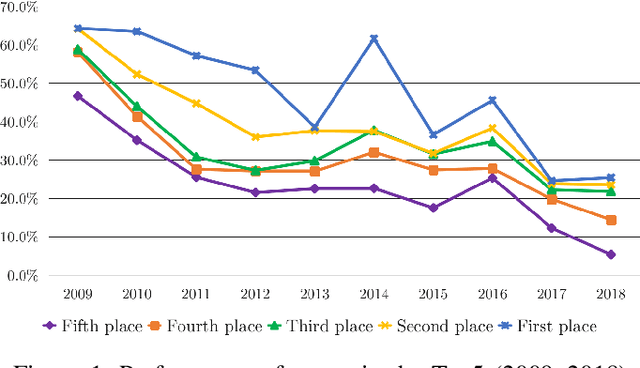


Abstract:Scientific competitions are crucial in the field of service robotics. They foster knowledge exchange and benchmarking, allowing teams to test their research in unstandardized scenarios. In this paper, we summarize the trending solutions and approaches used in RoboCup@Home. Further on, we discuss the attained achievements and challenges to overcome in relation with the progress required to fulfill the long-term goal of the league. Consequently, we propose a set of milestones for upcoming competitions by considering the current capabilities of the robots and their limitations. With this work we aim at laying the foundations towards the creation of roadmaps that can help to direct efforts in testing and benchmarking in robotics competitions.
Trends, Challenges and Adopted Strategies in RoboCup@Home
Mar 06, 2019


Abstract:Scientific competitions are crucial in the field of service robotics. They foster knowledge exchange and allow teams to test their research in unstandardized scenarios and compare result. Such is the case of RoboCup@Home. However, keeping track of all the technologies and solution approaches used by teams to solve the tests can be a challenge in itself. Moreover, after eleven years of competitions, it's easy to delve too much into the field, losing perspective and forgetting about the user's needs and long term goals. In this paper, we aim to tackle this problems by presenting a summary of the trending solutions and approaches used in RoboCup@Home, and discussing the attained achievements and challenges to overcome in relation with the progress required to fulfill the long-term goal of the league. Hence, considering the current capabilities of the robots and their limitations, we propose a set of milestones to address in upcoming competitions. With this work we lay the foundations towards the creation of roadmaps that can help to direct efforts in testing and benchmarking in robotics competitions.
RoboCup@Home: Summarizing achievements in over eleven years of competition
Feb 02, 2019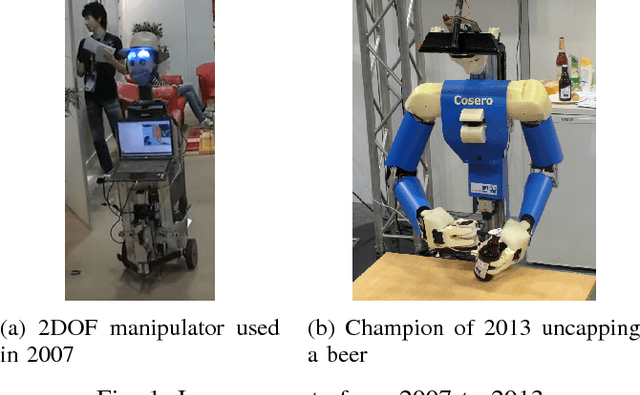
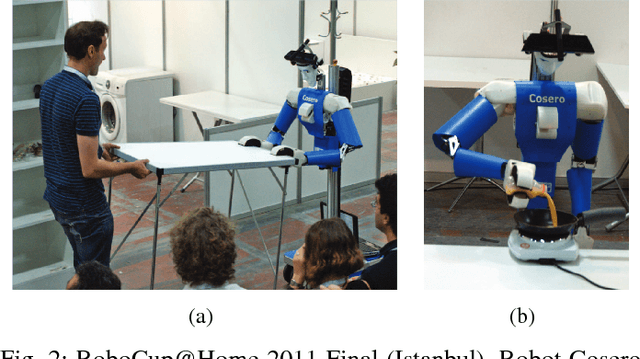
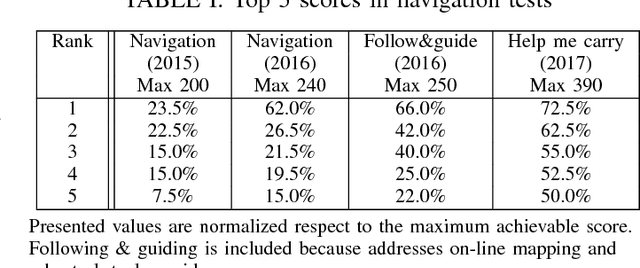
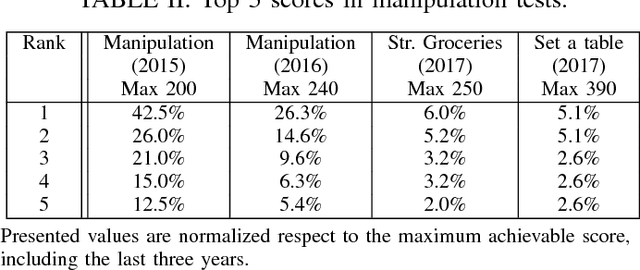
Abstract:Scientific competitions are important in robotics because they foster knowledge exchange and allow teams to test their research in unstandardized scenarios and compare result. In the field of service robotics its role becomes crucial. Competitions like RoboCup@Home bring robots to people, a fundamental step to integrate them into society. In this paper we summarize and discuss the differences between the achievements claimed by teams in their team description papers, and the results observed during the competition^1 from a qualitative perspective. We conclude with a set of important challenges to be conquered first in order to take robots to people's homes. We believe that competitions are also an excellent opportunity to collect data of direct and unbiased interactions for further research. ^1 The authors belong to several teams who have participated in RoboCup@Home as early as 2007
* 6 pages, 4 images, 3 tables Published in: 2018 IEEE International Conference on Autonomous Robot Systems and Competitions (ICARSC)
From Commands to Goal-based Dialogs: A Roadmap to Achieve Natural Language Interaction in RoboCup@Home
Feb 02, 2019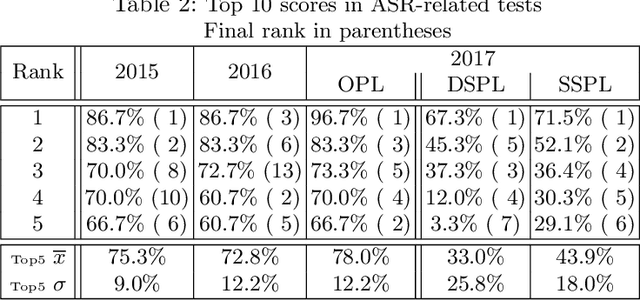
Abstract:On the one hand, speech is a key aspect to people's communication. On the other, it is widely acknowledged that language proficiency is related to intelligence. Therefore, intelligent robots should be able to understand, at least, people's orders within their application domain. These insights are not new in RoboCup@Home, but we lack of a long-term plan to evaluate this approach. In this paper we conduct a brief review of the achievements on automated speech recognition and natural language understanding in RoboCup@Home. Furthermore, we discuss main challenges to tackle in spoken human-robot interaction within the scope of this competition. Finally, we contribute by presenting a pipelined road map to engender research in the area of natural language understanding applied to domestic service robotics.
 Add to Chrome
Add to Chrome Add to Firefox
Add to Firefox Add to Edge
Add to Edge